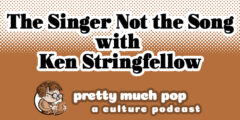The Singer or the Song? Ken Stringfellow (Posies, R.E.M., Big Star) and Pretty Much Pop: A Culture Podcast #23 Discuss

What's your relationship to music? Do you just embrace the pure sound, or do you care about who made that sound? One way of seeing where you fall on this issue is whether you care more for singles or to whole albums or careers by artists.
Ken Stringfellow, who co-fronts The Posies and was a member of R.E.M. and Big Star, joins Mark Linsenmayer, Erica Spyres, and Brian Hirt to talk about what actually grabs us about music, whether being a musician yourself is a key factor in whether you pay attention to the context of a song, how music gets to your ears, singers vs. songwriters, what we think about the notion of "genius," and how this artist vs. song conflict relates to how we take in other media (e.g. favorite film directors).
The ideas for this discussion mostly came from reflecting on our own experiences and habits, but we did some warm-up research into:
- Artists who hate their hit song: People, BBC, CheetSheet.com.
- Articles about trends in music sales, such as "Will the Single Kill the Album" by Steven Guttenberg, CNet News
- Various articles who call musicians "genius," like this one about Britney Spears from The Guardian.
- Also, Ric Ocasek (from The Cars) R.I.P.
- Quincy Jones complaining about Taylor Swift
Listen to Mark interview Ken on Nakedly Examined Music, presenting specifically some of his solo, Posies, and Big Star songs. After that was recording, Ken sang some harmonies on a tune on Mark's last album, Mark Lint's Dry Folk.
Other references: "Midnight Confessions" by The Grass Roots, Lil Peep, Tom Waits's most popular album, Lou Reed is not a one-hit wonder, the scene in Slacker with a fan getting Madonna's pubic hair, Damien Rice is still working, the band Live reunited, REM on Sesame Street (no, Ken is not on camera), Ken being "world music" by playing solo in foreign countries.
This episode includes bonus discussion that you can only hear by supporting the podcast at patreon.com/prettymuchpop. This podcast is part of the Partially Examined Life podcast network.
Pretty Much Pop: A Culture Podcast is the first podcast curated by Open Culture. Browse all Pretty Much Pop posts or start with the first episode.
The Singer or the Song? Ken Stringfellow (Posies, R.E.M., Big Star) and Pretty Much Pop: A Culture Podcast #23 Discuss is a post from: Open Culture. Follow us on Facebook, Twitter, and Google Plus, or get our Daily Email. And don't miss our big collections of Free Online Courses, Free Online Movies, Free eBooks, Free Audio Books, Free Foreign Language Lessons, and MOOCs.
from Open Culture https://ift.tt/35KuGfa
via Ilumina
Comments
Post a Comment